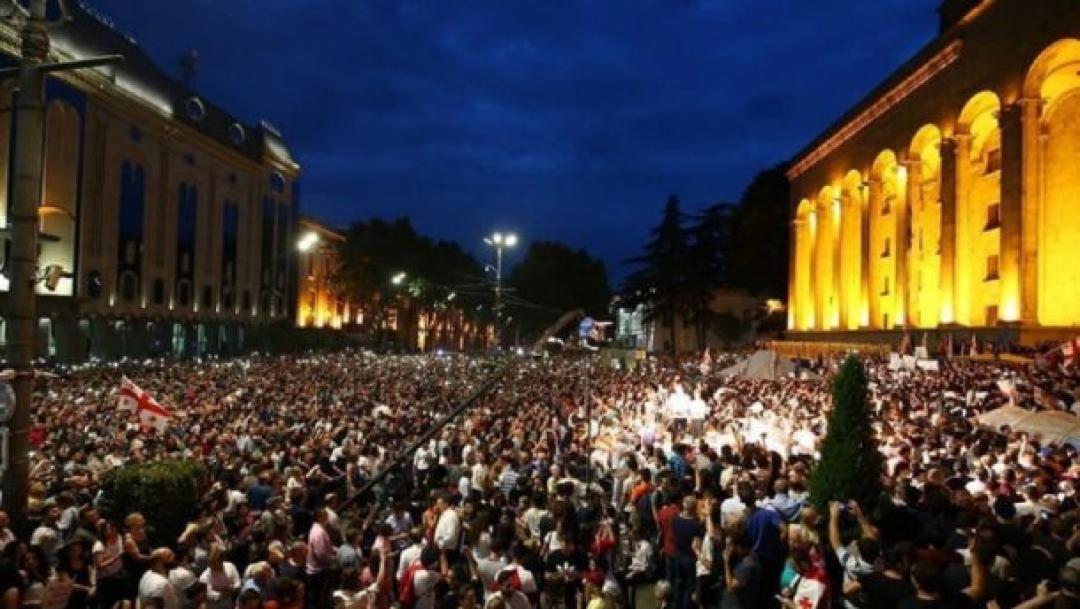
Prosecutor’s office of Georgia speaks of “coup attempts” during the protests

On 4 July, the Prosecutor’s Office of Georgia announced that it collected enough material evidence, as well as testimonies of dozens of witnesses to prove that a group of individuals plotted “a violent overthrow of the government to seize power” during the rally outside the parliament building on June 20-21, reported civil.ge.
In a released statement the Prosecutor’s Office said that the first phase of the planned coup involved storming the Parliament, which was to be followed by “criminal actions” throughout the country, that were “neutralized” through the efforts of the law enforcement officers. The new evidence, which was collected through the questioning of 170 witnesses so far, led to the aggravation of the potential charges. The original investigation was launched under Article 225 of the Criminal Code, which covers leading, inciting and participating in mass violence. The investigation now covers Article 315 of the Criminal Code of Georgia as well, namely the “Conspiracy or insurrection aimed at changing the constitutional order through violence” –specifically part 3, which targets the actions that lead to death or serious injury and is punishable by prison terms of 15 to 20 years.
Parallel to the investigations, the Georgian Ministry of Internal Affairs released a video, showing how four individuals who have been charged with violence at the June 20 Tbilisi demonstration used batons and other items to attack the police. The four individuals are Zurab Badaghashvili, Kakhaber Kupreishvili, Tsotne Soselia and Besik Tamliani. Soselia was detained for hooliganism and disobeying the police multiple times; Bagashvili was sentenced several times before for different crimes and was wanted for a year; Tamliani had his Georgian citizenship revoked in 2006 and has been a Russian citizen until 2018; while Kupreishvili travelled to Russia on 23 June 2019 and returned from Moscow on 25 June. They face six to nine years in prison.
The investigation of political figures is also still pending. The Ministry of Internal Affairs (MIA) appealed to the court with a request to have the opposition leaders Gigi Ugulava (European Georgia), Irakli Okruashvili (Victorious Georgia), and Gia Baramidze (United National Movement) questioned by the magistrate judge. According to MIA, the relevant decision was made due to the fact that all three politicians refused to arrive at the investigative agency for interrogation. Previously, Baramidze, the parliamentary member of the United National Movement, was charged for organizing violence on the Rustaveli Avenue on 20-21 June. He was released on bail with the prohibition to leave home without previously informing law enforcement officers, making public statements in public areas and communicating with witnesses. He has also been ordered to carry an electronic bracelet in order to be monitored by the law enforcement agencies at all times.
The Georgian opposition speaks of "political repression" in relation to the Prosecutor General's statement. The Georgian government's actions are in line with the political signals from Moscow, as the Kremlin insists that the organizers of the "warm welcome" of the Duma deputy Gavrilov in Tbilisi (ironic; meaning the attack by Georgian activists on Gavrilov following his speech in the Georgian parliament - ed .), said the UNM faction leader, Roman Goziridse. The Russian assessment of the events on the night of June 20 is thus shared by the Georgian Prosecutor General's Office, says the opposition MP.
See Also


Mirzoyan Meets US Deputy Assistant Secretary Joshua Huck

Azerbaijani President Holds Talks with UAE and German Business Delegations on Economic Cooperation

Grigoryan Confirms Armenia’s Readiness to Dissolve OSCE Minsk Group Upon Peace Treaty Signing

Azerbaijani Official Warns of Ecological Risks to Caspian Sea, Similar to Lake Urmia and Aral Sea

